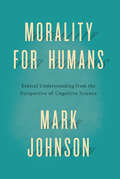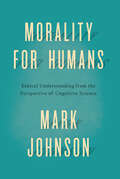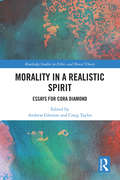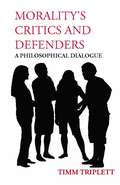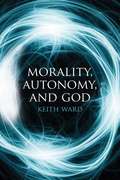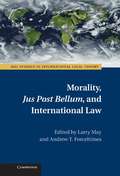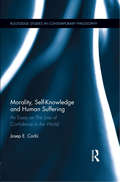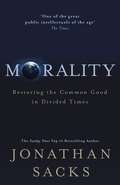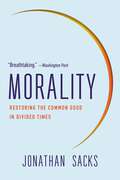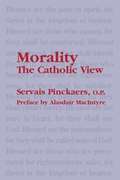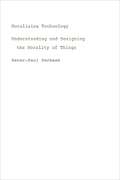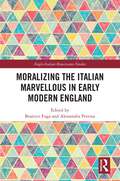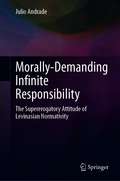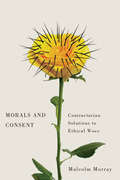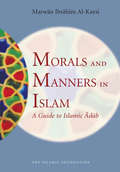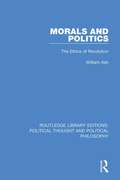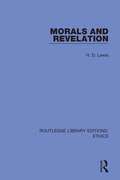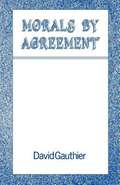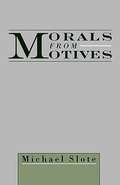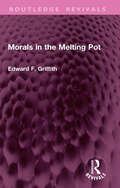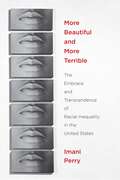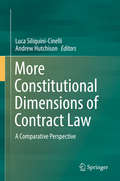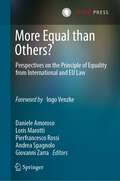- Table View
- List View
Morality for Humans: Ethical Understanding from the Perspective of Cognitive Science
by Mark JohnsonWhat is the difference between right and wrong? This is no easy question to answer, yet we constantly try to make it so, frequently appealing to some hidden cache of cut-and-dried absolutes, whether drawn from God, universal reason, or societal authority. Combining cognitive science with a pragmatist philosophical framework in Morality for Humans: Ethical Understanding from the Perspective of Cognitive Science, Mark Johnson argues that appealing solely to absolute principles and values is not only scientifically unsound but even morally suspect. He shows that the standards for the kinds of people we should be and how we should treat one another--which we often think of as universal--are in fact frequently subject to change. And we should be okay with that. Taking context into consideration, he offers a remarkably nuanced, naturalistic view of ethics that sees us creatively adapt our standards according to given needs, emerging problems, and social interactions. Ethical naturalism is not just a revamped form of relativism. Indeed, Johnson attempts to overcome the absolutist-versus-relativist impasse that has been one of the most intractable problems in the history of philosophy. He does so through a careful and inclusive look at the many ways we reason about right and wrong. Much of our moral thought, he shows, is automatic and intuitive, gut feelings that we follow up and attempt to justify with rational analysis and argument. However, good moral deliberation is not limited merely to intuitive judgments supported after the fact by reasoning. Johnson points out a crucial third element: we imagine how our decisions will play out, how we or the world would change with each action we might take. Plumbing this imaginative dimension of moral reasoning, he provides a psychologically sophisticated view of moral problem solving, one perfectly suited for the embodied, culturally embedded, and ever-developing human creatures that we are.
Morality for Humans: Ethical Understanding from the Perspective of Cognitive Science
by Mark JohnsonWhat is the difference between right and wrong? This is no easy question to answer, yet we constantly try to make it so, frequently appealing to some hidden cache of cut-and-dried absolutes, whether drawn from God, universal reason, or societal authority. Combining cognitive science with a pragmatist philosophical framework in Morality for Humans: Ethical Understanding from the Perspective of Cognitive Science, Mark Johnson argues that appealing solely to absolute principles and values is not only scientifically unsound but even morally suspect. He shows that the standards for the kinds of people we should be and how we should treat one another—which we often think of as universal—are in fact frequently subject to change. And we should be okay with that. Taking context into consideration, he offers a remarkably nuanced, naturalistic view of ethics that sees us creatively adapt our standards according to given needs, emerging problems, and social interactions. Ethical naturalism is not just a revamped form of relativism. Indeed, Johnson attempts to overcome the absolutist-versus-relativist impasse that has been one of the most intractable problems in the history of philosophy. He does so through a careful and inclusive look at the many ways we reason about right and wrong. Much of our moral thought, he shows, is automatic and intuitive, gut feelings that we follow up and attempt to justify with rational analysis and argument. However, good moral deliberation is not limited merely to intuitive judgments supported after the fact by reasoning. Johnson points out a crucial third element: we imagine how our decisions will play out, how we or the world would change with each action we might take. Plumbing this imaginative dimension of moral reasoning, he provides a psychologically sophisticated view of moral problem solving, one perfectly suited for the embodied, culturally embedded, and ever-developing human creatures that we are.
Morality in a Realistic Spirit: Essays for Cora Diamond (Routledge Studies in Ethics and Moral Theory)
by Craig Taylor Andrew GleesonThis unique collection of essays has two main purposes. The first is to honour the pioneering work of Cora Diamond, one of the most important living moral philosophers and certainly the most important working in the tradition inspired by Ludwig Wittgenstein. The second is to develop and deepen a picture of moral philosophy by carrying out new work in what Diamond has called the realistic spirit. The contributors in this book advance a first-order moral attitude that pays close attention to actual moral life and experience. Their essays, inspired by Diamond’s work, take up pressing challenges in Anglo-American moral philosophy, including Diamond’s defence of the concept ‘human being’ in ethics, her defence of literature as a source of moral thought that does not require external sanction from philosophy, her challenge to the standard ‘fact/value’ dichotomy, and her exploration of non-argumentative forms of legitimate moral persuasion. There are also essays that apply this framework to new issues such as the nature of love, the connections of ethics to theology, and the implications of Wittgenstein’s thought for political philosophy. Finally, the book features a new paper by Diamond in which she contests deep-rooted philosophical assumptions about language that severely limit what philosophers see as the possibilities in ethics. Morality in a Realistic Spirit offers a tribute to a great moral philosopher in the best way possible—by taking up the living ideas in her work and taking them in original and interesting directions.
Morality's Critics and Defenders: A Philosophical Dialogue
by Timm TriplettIn this engaging and accessible dialogue, four students offer contrasting arguments on the nature and scope of morality. While specific social policy issues, such as animal rights and racism, come into play, the discussions focus on more general--and fundamental--questions, including:Does morality limit personal freedom?Is morality relative to culture, or is it universal?What is the motivation to be moral?Is religion in tension with secular moral principles?Does science undermine morality?Can a common morality emerge out of the diversity of human interests? A glossary of important terms and suggestions for further reading are included.
Morality, Autonomy, and God
by Keith WardIn Morality, Autonomy, and God, acclaimed philosopher-theologian Keith Ward argues a strong controversial thesis: that morality is not autonomous, and that theistic morality is deeply rational and of critical importance, especially in modern societies. Referring in detail to contemporary work in moral philosophy, especially where it impinges on religious beliefs, Ward defends the view that certain conceptions of morality depend, in important ways, upon the belief in God. But Ward is careful to argue that the idea of God defended is not necessarily or exclusively Christian. Only in the final chapter does he specifically address problems of morality and Christian doctrine.Academic and rigorous in its approach, and written with characteristic verve, Morality, Autonomy, and God is a significant contribution to the field of moral philosophy and the current debate about the link between religion and morality is today's world.
Morality, Jus Post Bellum, and International Law
by Larry May Andrew T. ForcehimesThis collection of essays brings together some of the leading legal, political and moral theorists to discuss the normative issues that arise when war concludes and when a society strives to regain peace. In the transition from war, mass atrocity or a repressive regime, how should we regard the idea of democracy and human rights? Should regimes be toppled unless they are democratic or is it sufficient that these regimes are less repressive than before? Are there moral reasons for thinking that soldiers should be relieved of responsibility so as to advance the goal of peace building? And how should we regard the often conflicting goals of telling the truth about what occurred in the past and allowing individuals to have their day in court? These questions and more are analyzed in detail. It also explores whether jus post bellum itself should be a distinct field of inquiry.
Morality, Self Knowledge and Human Suffering: An Essay on The Loss of Confidence in the World (Routledge Studies in Contemporary Philosophy)
by Josep CorbíIn this wholly original study, Josep Corbi asks how one should relate to a certain kind of human suffering, namely, the harm that people cause one another. Relying upon real life examples of human suffering--including torture, genocide, and warfare--as opposed to thought experiments, Corbi proposes a novel approach to self-knowledge that runs counter to standard Kantian approaches to morality.
Morality: An Introduction to Ethics
by Bernard WilliamsBernard Williams's remarkable essay on morality confronts the problems of writing moral philosophy, and offers a stimulating alternative to more systematic accounts which seem nevertheless to have left all the important issues somewhere off the page. Williams explains, analyses and distinguishes a number of key positions, from the purely amoral to notions of subjective or relative morality, testing their coherence before going on to explore the nature of 'goodness' in relation to responsibilities and choice, roles, standards, and human nature. The final chapters make a fascinating enquiry into what morality is about, looking beyond happiness to other human aims and ideals. This re-issue of a classic in moral philosophy includes a new foreword by the author.
Morality: Restoring the Common Good in Divided Times
by Jonathan SacksWe are living through a period of cultural climate change. We have outsourced morality to the markets on the one hand, and the state on the other. The markets have brought wealth to many, and the state has done much to contain the worst excesses of inequality, but neither is capable of bearing the moral weight of showing us how to live. This has had a profound impact on society and the way in which we interact with each other. Traditional values no longer hold, yet recent political swings show that modern ideals of tolerance have left many feeling rudderless and adrift. In this environment we see things fall apart in unexpected ways - toxic public discourse makes true societal progress almost unattainable, a more divisive society is fuelled by identity politics and extremism, and the rise of a victimhood mentality calls for 'safe spaces' but stifles debate. The influence of social media seems all-pervading and the breakdown of the family is only one result of the loss of social capital. Many fear what the future may hold.Delivering a devastatingly insightful critique of our modern condition, and assessing its roots and causes from the ancient Greeks through the Reformation and Enlightenment to the present day, Sacks argues that there is no liberty without morality, and no freedom without responsibility.If we care about the future of western civilisation, all of us must play our part in rebuilding our common moral foundation. Then we will discover afresh the life-transforming and counterintuitive truths that a nation is strong when it cares for the weak, and rich when it cares for the poor.Here is an inspiring vision of a world in which we can all find our place, and face the future without fear.
Morality: Restoring the Common Good in Divided Times
by Jonathan SacksA distinguished religious leader's stirring case for reconstructing a shared framework of virtues and values. With liberal democracy embattled, public discourse grown toxic, family life breaking down, and drug abuse and depression on the rise, many fear what the future holds. In Morality, respected faith leader and public intellectual Jonathan Sacks traces today's crisis to our loss of a strong, shared moral code and our elevation of self-interest over the common good. We have outsourced morality to the market and the state, but neither is capable of showing us how to live. Sacks leads readers from ancient Greece to the Enlightenment to the present day to show that there is no liberty without morality and no freedom without responsibility, arguing that we must all must play our part in rebuilding a common moral foundation. A major work of moral philosophy, Morality is an inspiring vision of a world in which we can all find our place and face the future without fear.
Morality: The Catholic View
by Alasdair Macintyre Servais Pinckaers Michael SherwinFr. Servais Pinckaers’s work is well on its way to being accepted as the work on Catholic moral thinking for the coming generation of laymen and students. Pinckaers sharply distinguishes this view of morality from modern “moralities of obligation,” which regard the moral life primarily as obedience to rules that limit human freedom and curb human desires.
Moralizing Technology: Understanding and Designing the Morality of Things
by Peter-Paul VerbeekTechnology permeates nearly every aspect of our daily lives. Cars enable us to travel long distances, mobile phones help us to communicate, and medical devices make it possible to detect and cure diseases. But these aids to existence are not simply neutral instruments: they give shape to what we do and how we experience the world. And because technology plays such an active role in shaping our daily actions and decisions, it is crucial, Peter-Paul Verbeek argues, that we consider the moral dimension of technology. Moralizing Technology offers exactly that: an in-depth study of the ethical dilemmas and moral issues surrounding the interaction of humans and technology. Drawing from Heidegger and Foucault, as well as from philosophers of technology such as Don Ihde and Bruno Latour, Peter-Paul Verbeek locates morality not just in the human users of technology but in the interaction between us and our machines. Verbeek cites concrete examples, including some from his own life, and compellingly argues for the morality of things. Rich and multifaceted, and sure to be controversial, Moralizing Technology will force us all to consider the virtue of new inventions and to rethink the rightness of the products we use every day.
Moralizing the Italian Marvellous in Early Modern England (Anglo-Italian Renaissance Studies)
by Alessandra Petrina Beatrice FugaThis volume breaks new ground in the exploration of Anglo-Italian cultural relations: it presents analyses of a wide range of early modern Italian texts adapted into contemporary English culture, often through intermediary French translations. When transposed into English, their Italian origin was frequently categorized as marvellous and consequently censured because of its strangeness: thus, English translators often gave their public a moralized and tamed version of Italy’s uniqueness. This volume’s contributors show that an effective way of moralizing Italian custom was to exoticize its origins, in order to protect the English public from an Italianate influence. This ubiquitous moralization is visible in the evolution of the concept of tragedy, and in the overtly educational aim acquired by the Italian novella, adapted for an allegedly female audience. Through the analysis of various literary genres (novella, epic poem, play, essay), the volume focuses on the mechanisms of appropriation and rejection of Italian culture through imported topoi and narremes.
Morally-Demanding Infinite Responsibility: The Supererogatory Attitude of Levinasian Normativity
by Julio AndradeThis book presents a conceptual mapping of supererogation in the analytic moral philosophical tradition. It first asks whether supererogation can be conceptualised in the absence of obligation or duty and then makes the case that it can be. It does so by enlisting the resources of the continental tradition, specifically using the work of Emmanuel Levinas and his notion of infinite responsibility. In so doing the book contributes to the ongoing efforts to create a common ethical terminology between the analytic and continental traditions within moral philosophy. Supererogatory actions are praiseworthy actions that go ‘beyond duty’, and yet are not blameworthy when not performed. In responding to this paradox, moral philosophy either brackets or attempts a reductionism of supererogation. Supererogation is epitomised in the paradigmatic figures of the saint and hero. Yet, most would agree that emulating these figures is too morally demanding. We rightly ask: where does moral obligation end? Is it even possible, or desirable to demarcate such a boundary? Besides the important theoretical issues these questions raise, they also speak to practical ethical dilemmas in the contemporary milieu, as they concern the global wealthy’s responsibility to the poor and the challenges of development aid work.
Morals and Consent: Contractarian Solutions to Ethical Woes
by Malcolm MurrayHow are we meant to behave? And how are we to defend whatever answer we give? Morals and Consent grounds our notion of morality in natural evolution, and from that basis, Malcolm Murray shows why contractarianism is a far more viable moral theory than is widely believed. The scope of Morals and Consent has two main parts: theory and application. In his discussion of theory, Murray defends contractarianism by appealing to evolutionary game theory and metaethical analyses. His main argument is that we are not going to find morality as an objective fact in the world, and that instead, we can understand morality as a reciprocal cooperative trait. From this minimal moral architecture, Murray derives his innovative consent principle. The application of the theory, detailing what contractarians can – or ought to – say about moral matters, takes up the greater portion of the work. Murray offers a trenchant examination of what moral constraints we can claim concerning death (abortion, euthanasia, and capital punishment), sex (pornography, prostitution, and sexual assault), beneficence (toward present and future people, animals, and the environment), and liberty (genetic enhancement, organ sales, and torture). By focusing on evolutionary contractarianism and the epistemic justification of our moral claims – or lack thereof – Malcolm Murray’s Morals and Consent is a serious advance in the field of applied ethics and fills an important void.
Morals and Manners in Islam
by Marwan Ibrahim Al-KaysiMorals and Manners in Islam is a brief yet comprehensive handbook for Muslims and those non-Muslims interested in acquiring a broad knowledge of the Muslim way of life. The book's contents, derived mainly from the Qur'an and the Sunnah, the main sources of jurisprudence, are listed in points format.
Morals and Markets
by Daniel Mcneill Daniel FriedmanIn this book, economist and evolutionary game theorist Daniel Freidman demonstrates that our moral codes and our market systems, while often in conflict, are really devices evolved to achieve similar ends, and that society functions best when morals and markets are in balance with each other.
Morals and Politics: The Ethics of Revolution (Routledge Library Editions: Political Thought and Political Philosophy #2)
by William AshFirst published in 1977. Ethics is the most practical branch of philosophy: its immediate concern is with people's actions. Yet most philosophers do little to relate ethics intelligibly to the human situation. In this inquiry into the nature of ethics, William Ash draws on the relevant works of Marx, Engels, Lenin and Stalin to present the theory and practice of Marxist ethics. He offers an explanation of the moral aspect of Marx's dictum: 'The philosophers have only interpreted the world, in various ways; the point, however, is to change it.‘ The book includes, perhaps for the first time in so considered a form, an assessment of Mao Tsetung's contribution to Marxist moral philosophy, together with the ethical implications of such developments in social practice as the Proletarian Cultural Revolution. The author deals with the question of value by analysing the concept of 'good'; with the question of claims on people and things by analysing the concept of 'right'; with the question of the limits and scope of freedom of choice and action by analysing the concept of 'ought'.’ Clearly written in order to 'de-mystify' the subject, the book challenges readers to test the author's enlightened, Marxist approach in terms of the ethical ordering of their own society.
Morals and Revelation
by H. D. LewisOriginally published in 1951, this book discusses morality and religion , with special attention being paid to the theologian Emil Brunner. It critically examines the state of ethical thinking in the first half of the twentieth century and examines the question of freedom and guilt particularly in relation to psychological theories. The issue of collective guilt is also subjected to close analysis. The problem of our knowledge of God is also discussed with the focus on mysticism and revelation.
Morals by Agreement
by David Gauthier'The high point of its author's achievement, and a major work in contemporary moral and political philosophy.' --The Times Higher Education Supplement
Morals from Motives
by Michael SloteMorals from Motives develops a virtue ethics inspired more by Hume and Hutcheson's moral sentimentalism than by recently-influential Aristotelianism. It argues that a reconfigured and expanded "morality of caring" can offer a general account of right and wrong action as well as social justice. Expanding the frontiers of ethics, it goes on to show how a motive-based "pure" virtue theory can also help us to understand the nature of human well-being and practical reason.
Morals in the Melting Pot (Routledge Revivals)
by Edward F. GriffithFirst published in 1948, Morals in the Melting Pot is an important historical reference work addressing some of the age-old moral dilemmas in society. Edward Griffith discusses themes like contraception, sex and religion, divorce, homosexuality, abortion, adolescent problems, preparation for marriage, and extramarital relationships. The author argues for having the capacity to appreciate moral truth and give integrity and purpose to actions which can otherwise become isolated and devoid of meaning and he says that this requires a degree of spiritual awareness which many people seem to ignore or don't even possess. This book will be of interest to scholars and researchers of sociology, ethics and moral philosophy.
More Beautiful and More Terrible: The Embrace and Transcendence of Racial Inequality in the United States
by Imani PerryPerry argues that racism in America has moved into a new phase--post-intentionalFor a nation that often optimistically claims to be post-racial, we are still mired in the practices of racial inequality that plays out in law, policy, and in our local communities. One of two explanations is often given for this persistent phenomenon: On the one hand, we might be hypocritical—saying one thing, and doing or believing another; on the other, it might have little to do with us individually but rather be inherent to the structure of American society.More Beautiful and More Terrible compels us to think beyond this insufficient dichotomy in order to see how racial inequality is perpetuated. Imani Perry asserts that the U.S. is in a new and distinct phase of racism that is “post-intentional”: neither based on the intentional discrimination of the past, nor drawing upon biological concepts of race. Drawing upon the insights and tools of critical race theory, social policy, law, sociology and cultural studies, she demonstrates how post-intentional racism works and maintains that it cannot be addressed solely through the kinds of structural solutions of the Left or the values arguments of the Right. Rather, the author identifies a place in the middle—a space of “righteous hope”—and articulates a notion of ethics and human agency that will allow us to expand and amplify that hope.To paraphrase James Baldwin, when talking about race, it is both more terrible than most think, but also more beautiful than most can imagine, with limitless and open-ended possibility. Perry leads readers down the path of imagining the possible and points to the way forward.
More Constitutional Dimensions of Contract Law: A Comparative Perspective
by Luca Siliquini-Cinelli Andrew HutchisonThis second volume on the constitutional dimension of contract law explores this increasingly relevant subject in jurisdictions that are usually overlooked by mainstream scholarship in the English-speaking world. With chapters on Finland and other Nordic Countries from a comparative perspective, Spain, Japan, Somalia, Nigeria, Brazil, and Peru, the contributions presented here offer much-needed, context-informed insights on whether – and if so, why, how and to what extent – the development of contract law is being influenced by constitutional values and fundamental rights issues (or vice-versa). The book represents a valuable addition to comparative law literature on the interplay between public (i.e., constitutional) and private (i.e., contract) law by revealing the inner dynamics through which these two branches interact and (at times) inform each other, whilst also enhancing our understanding of the law’s nature, function, and transformative potential at the macro, meso, and micro levels.
More Equal than Others?: Perspectives on the Principle of Equality from International and EU Law
by Giovanni Zarra Pierfrancesco Rossi Daniele Amoroso Loris Marotti Andrea SpagnoloThis book analyses the principle of equality from three perspectives: public international law, private international law and EU law. It is the first book in English providing a comprehensive overview of this principle in these areas of law and showing the current trends and issues concerning its application. Its main goal is to understand whether and to what extent the principle of equality has been affirmed in public and private international law, as well as EU law, and what – if any – the common core of this principle is.The analysis carried out in this contributed volume starts from general analyses of the principle of equality in the areas of the law covered by the book and then discusses the principle in more specific areas, such as human rights law, international adjudication (including investment law) and the law of international organizations. The book is intended to become a benchmark for academics dealing with matters of equality in public international law, private international law and EU law. It will be a useful tool for practitioners too, the collected chapters being based on the relevant case law dealing with the principle of equality. Daniele Amoroso is Professor of International Law in the Department of Law of the University of Cagliari, Cagliari, Italy. Loris Marotti is Assistant Professor of International Law in the Department of Law at the Federico II University of Naples, Italy. Pierfrancesco Rossi is Postdoctoral Fellow in International Law in the Department of Law of Luiss University, Rome, Italy. Andrea Spagnolo is Professor of International Law in the Department of Law of the University of Turin, Turin, Italy. Giovanni Zarra is Professor of International Law and International Litigation in the Department of Law at the Federico II University of Naples, Italy.
